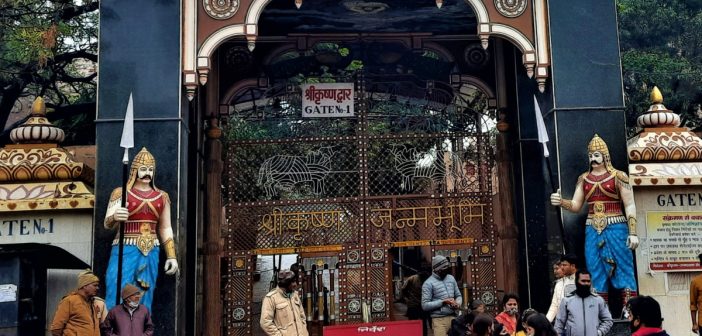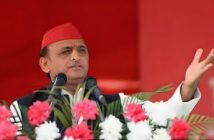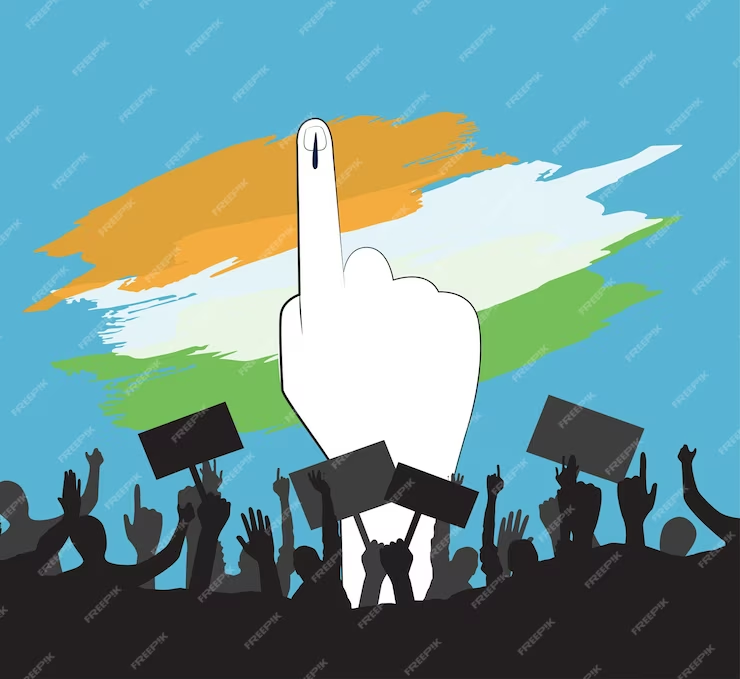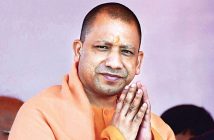The contrast couldn’t be more stark. An imposing Krishna temple surrounded by a vast number of glistening shops and hotels. A neglected mosque whose approach lane is swathed in filth, around which live impoverished Muslim families.
The lacklustre mosque was a non-entity in the ecosystem around the temple, as well as in the holy town of Mathura that is said to have more temples than its lanes.
And yet, even those people have now begun demanding the removal of the mosque that barely stirred their cultural memory. While Mathura appeared in the original BJP slogan during the Ram temple movement of the 1980s — Yeh to sirf jhanki hai, abhi to Kashi, Mathura baaki hai (This is a mere trailer, Kashi and Mathura still remain) — the city saw little tension during those violent years. The mosque suddenly became a major political issue after Chief Minister Yogi Adityanath and Deputy Chief Minister Keshav Prasad Maurya raised the issue of temple construction in Mathura and the latent Hindu identity of the residents received a violent blow.
“Muslims encroached upon our land. We need it back,” says Girdhari Lal Gautam, 65, a shopkeeper outside the Krishna Janmbhoomi temple. Rahul Thakur, a younger shopkeeper, says it loudly: “The mosque will have to be demolished. Let Yogi return (as the CM).”
The city was tense after the Hindu Mahasabha announced that they would install a Krishna idol in the mosque on December 6, the anniversary of the Babri mosque demolition.
“There were rumors that an idol will be placed here. When the Ayodhya judgment (by SC) came, we were told that now that you have given up this mosque, everything will be resolved.
But they are destroying new mosques and mazhars,” says Raju Qureshi, who lives close to the mosque and runs a passenger tempo between Mathura and Vrindavan.
“They are saying that a temple will be built here. It’s threatening,” says an old Muslim widow Lalli, who lives in a dark narrow lane near the mosque.
She talks about her economic hardships – her deceased husband, how her home doesn’t have a roof and her family has little to survive on.
A tube-well near the mosque serves as the only source of water for several neighbouring Muslim families. Aqila is a mother of four children.
Her husband is a rickshaw-driver. Their three children, including two daughters, are illiterate because they can’t afford school fees. She comes with her daughters from a distance to fetch water.
The Assault
Away from the tensions in Ayodhya, Mathura city in West UP had been living in peace before a local court in October 2020 admitted a plea by advocate Ranjana Agnihotri and seven others on behalf of the Krishna deity seeking the removal of the mosque and recovery of 13.37 acre land in the temple area.
Soon another plea was filed by a priest Pawan Kumar Shastri on behalf of the deity for the removal of the mosque and in February 2021 a Mathura court issued notice to Shahi Idgah Management Committee and others seeking their stand on the plea.
Shastri also demanded the annulment of an old ruling of a Mathura court that had ratified a land deal between Shri Krishna Janmasthan Seva Sansthan and Shahi Idgah Management Committee that allowed the co-existence of the mosque and the temple.
In June 2021, an organization named Sri Krishna Janmabhumi Mukti Aandolan Samiti moved a plea before a Mathura court offering Muslims a larger piece of land elsewhere if they agree to remove the mosque.
In these overt attempts to make the city the next Ayodhya inherent is the systematic assault on Muslims, which is not limited to Mathura.
Ordinary Muslims in West UP are full of stories about how small vendors, shopkeepers, tailors are being discriminated against.
“Hindus have reduced their purchases from us,” says Abdul Rahman, a tailor from Saharanpur.
A fruit seller Javed outside Darul Uloom says that earlier four-five Innovas and Scorpios ran between Deoband and Delhi, carrying Muslim traders and ordinary passengers. “Hardly one goes to Delhi now.
Our livelihood has been destroyed,” says Mohammad Said, a neighbouring seller of dry fruits.Raju Qureshi says that the police often issues challan to Muslim tempo drivers. “They often make us stop and threaten to seize the vehicle,” he says.
Professor Mohammad Sajjad, who teaches modern and contemporary history at Aligarh Muslim University, says that “there is a history of such economic boycott”. “It occurs whenever communalism increases.
It happened before Independence in the 1920s, 1940s. The Bhagalpur riots took place in 1989, but its build-up had begun in everyday life in the form of economic boycott,” he says.
“Communalization has been at its peak for a long time, particularly in West UP. Whenever communalism finds any political and administrative patronage, such trends surge,” says the professor.
The politics in Mathura
Curiously, Mathura is the only constituency among the many Outlook visited across several districts in the first phase of elections where people said that the Congress is strong and in contest.
Congress candidate Pradip Mathur, who has won the constituency on four occasions, seems to be the choice of several Muslims and some upper caste communities here.
People are generally angry with the sitting BJP MLA, Power Minister Shrikant Sharma because, they say, he’s remained mostly absent and done little for the constituency.
Even those like Gautam who want the removal of the mosque use choicest words for Sharma. “He has done nothing, he’s arrogant,” says Gautam. In the trans-Yamuna village of Ishapur people are angry because the road to their village has turned into a long patch of slippery mud.
“You have a triple engine government here, even the councillor is from BJP, but they have done nothing,” says Girish Sharma, a farmer and dairy owner.
Shrikant Sharma’s chances are further jeopardized by the BSP candidate SK Sharma, who was with the BJP since 1980s but recently left the party after he was denied a ticket, and soon joined the Mayawati camp.
Does that mean a certain defeat of the BJP? Not necessarily, because here enters the Hindu factor. “We don’t like Sharma, but we will vote for Yogi and Modi,” says Gautam.
The anti-Muslim sentiment pervades among the Dalits as well, fuelled by a perception that the other parties, particularly the Samajwadi Party, patronized “Muslim criminals”.
In Khatiq Mohalla of Mathura’s Barhpura, several Valmikis and Khatiqs (both sub-castes of SC) echo the sentiment.
“The BJP has done a lot for Hindus, constructed the temple, brought Kashmir under our control by ending Article 370,” says Sumit Kumar, who works at contractual scavenger in the cantonment area.
Over 200 km away, Praveen Kumar, a Jatav worker at a brick factory on the Meerut-Shamli border, says that his vote will go to Mayawati, but quickly adds that “the Modi government has certainly done one thing, which no one can deny that it ended the hooliganism of Muslims that was widespread during the SP rule”. “If the Hindus come together to prevent the SP, it will be nowhere,” he says.
When everyday discrimination against a community is supported by a government almost as a state policy, it takes the form of apartheid.
The community faces economic boycott, cultural slurs and is placed on a constant trial. “I often face taunts in trains — are you Taliban?” says a maulvi in Saharanpur with a blank face.
But how do the Muslims live with this daily trauma? “A section of the minorities believe that they will have to live like this for long. Some believe that this is a temporary phase,” Mohammad Sajjad says.
“It remains a part of memory. It is painful, torturous.”




